Big Red Book
Celebrating television's This Is Your Life
Bill MAYNARD (1928-2018)
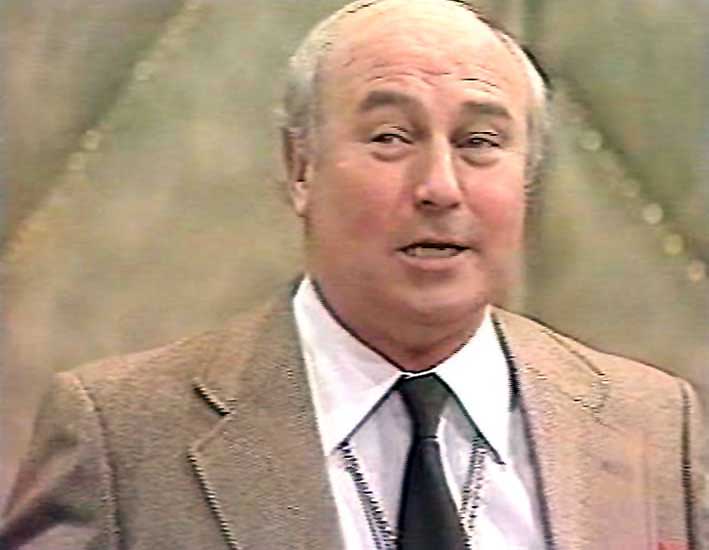
THIS IS YOUR LIFE - Bill Maynard, actor and comedian, was surprised by Eamonn Andrews while travelling by train from Manchester to London, having been led to believe he was due there to film a scene for his latest television series.
Bill, who was born in Surrey, began his career as a variety performer in local clubs and music halls at the age of eight. From there, he progressed to repertory theatre and a stint as a stand-up comedian at London's Windmill Theatre. He met comedy actor Terry Scott while working at Butlins Holiday Camp in Skegness, and they later appeared together in the popular BBC television series Great Scott, It's Maynard!
Following a lean period, Bill successfully returned to acting in the 1970s, receiving critical acclaim for his performance in a 1971 television adaptation of the Dennis Potter play Paper Roses. He also appeared in several Carry On films, and in 1974, was cast as the hapless handyman in the ITV sitcom Oh No, It's Selwyn Froggitt - a role that made him a household name.
"You bastards... I'm going to kill my wife for this!"
programme details...
- Edition No: 392
- Subject No: 392
- Broadcast date: Wed 4 Dec 1974
- Broadcast time: 7.00-7.30pm
- Recorded: Wed 16 Oct 1974
- Venue: Euston Road Studios
- Series: 15
- Edition: 5
- Code name: Reprise
on the guest list...
- Eric Prytherch
- Anne Wilkie-Millar
- Muriel - wife
- Martin - son
- Jane - daughter
- Edith - mother
- Walter - father
- Jon Pertwee
- Frank Dunlop
- Johnny Greenaway
- John Neville Filmed tribute:
- Terry Scott
related appearances...
- Jon Pertwee - Apr 1971
- Terry Scott - Nov 1978
- David Berglas - Dec 1991
- Bill Pertwee - Feb 1999
production team...
- Researcher: unknown
- Writer: unknown
- Director: Robert Reed
- Producer: Jack Crawshaw
- names above in bold indicate subjects of This Is Your Life
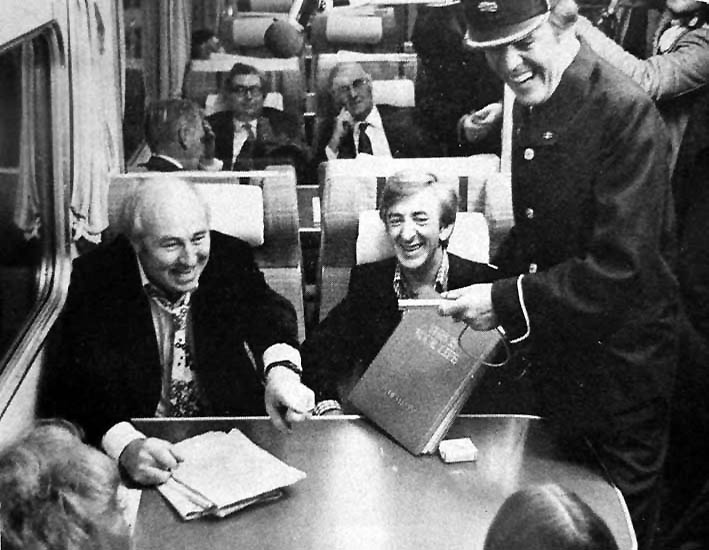
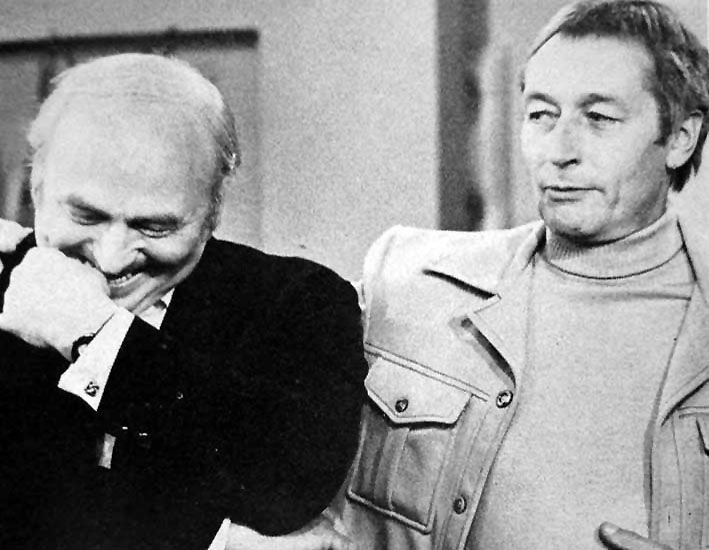
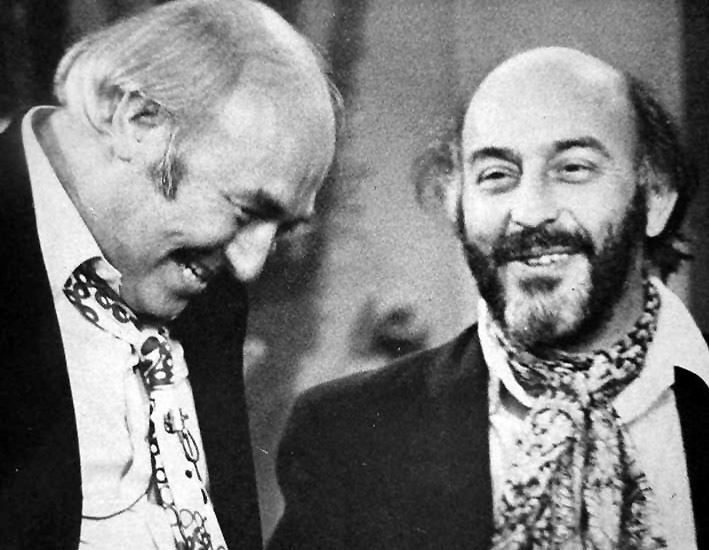
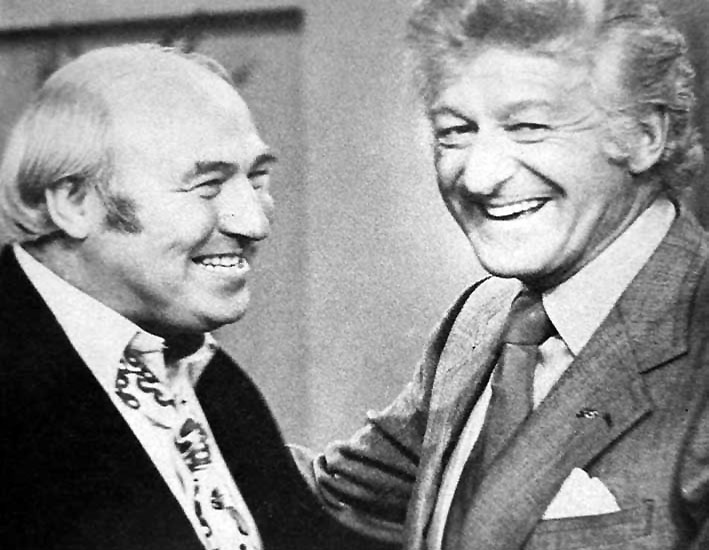
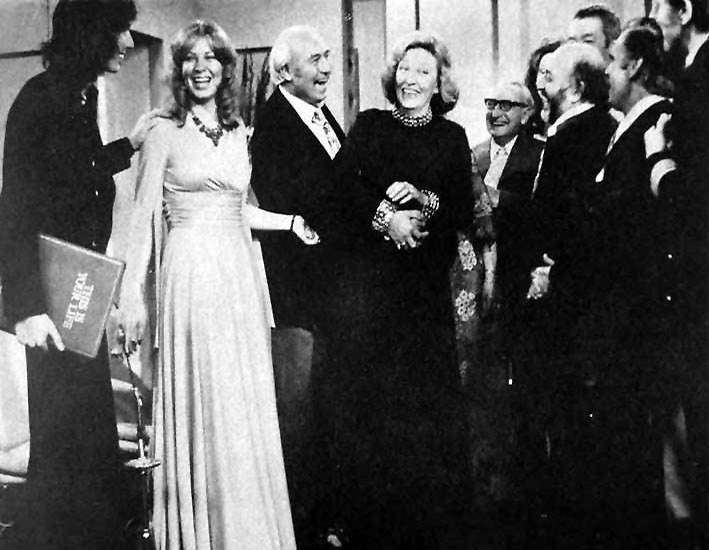
Photographs of Bill Maynard This Is Your Life
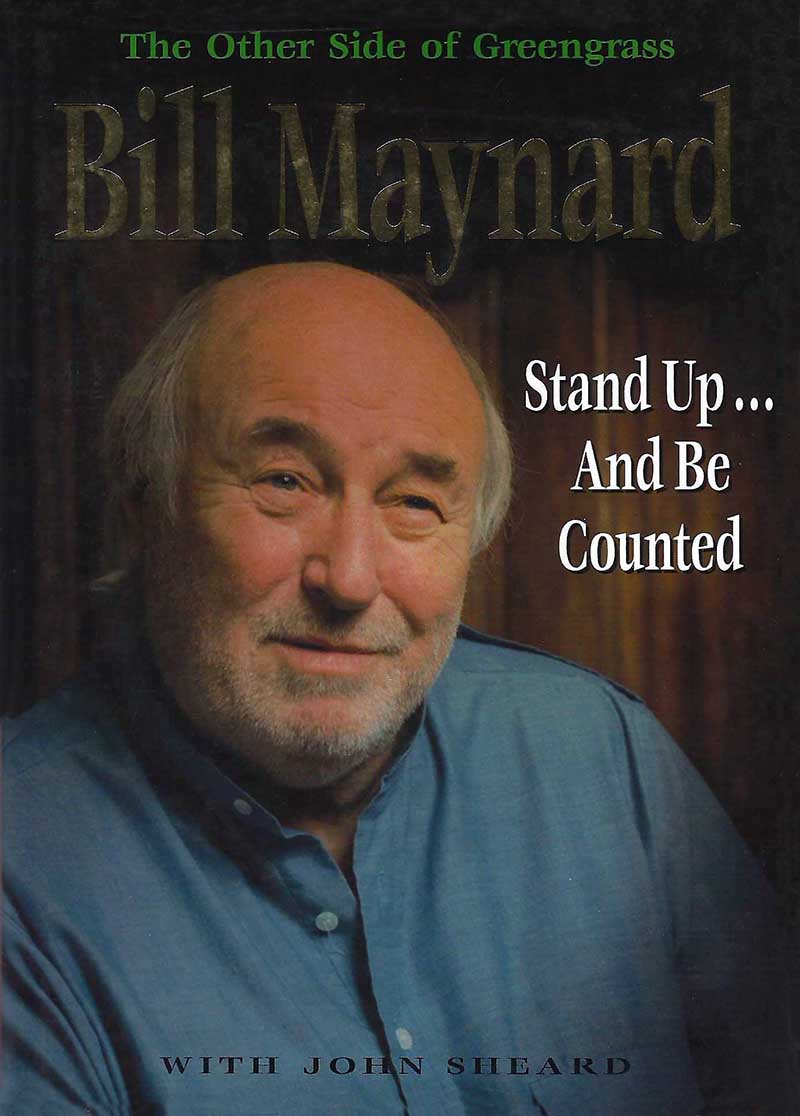
One dark evening in 1973, I found myself on a train from Manchester to London with Life of Riley director Taffy Prytherch and Anne Wilkie-Millar, a top Granada production assistant who was – and still is – something of a legend in her own right, one of these people in television who do not get a lot of the glory but whose work is quite crucial: PAs are the people who mother-hen any production, making sure that everyone is where he or she should be at the right place at the right time when the cameras are ready to roll. Not an easy task where there tends to be an anarchic streak in many of the creative people involved. Anne was and still is, I believe, one of the cogs which has kept the Coronation Street machine turning smoothly over something like 30 years.
Yet despite this interesting company, I was not a happy man. The trip to London was, in itself, something of a bind and strange things had been happening in my life, both on the Riley set and at home back in Sapcote.
For a start, there had been rows back at home. My daughter Jane had now left school but had still to settle into the modelling career she had chosen. And night after night, she was leaving home by herself and going off to London, to do what I did not know. There is perhaps a good deal of hypocrisy involved in the relationship between any father and daughter and for pretty obvious reasons: fathers know how young men look upon young women and I perhaps knew better than most. I assumed that Jane had a boyfriend in London and I was far from pleased that she was spending so much time with him but never brought him home. Was something amiss? Apart from anything else, I kept asking Muriel, where was she getting the money for all this gadding about?
Muriel was, by this time, totally in control of the family finances: I had learned my lesson the hard way and realised that I was totally unfit to be in charge of the purse strings. Muriel kept the books, paid the bills, ensured that the taxman was paid and doled out living money for me whenever I needed it. Our financial worries were by now largely over but I still did not like the idea of a teenage girl shuttling back and forwards from London, for I knew only too well the cost involved. This had led to rows with Jane, who seemed to becoming increasingly irritated, but I put this down to typical teenage tantrums. Trouble was, this friction seemed to be getting to Muriel, too, and she was acting tense and withdrawn, something which I had rarely seen, even in our worse days in the showbusiness wilderness.
I would have been less worried had I known about the activities of my son, Martin, now launched on a promising career as a musician. Like me as a lad, he had shown a remarkable aptitude in learning to play a variety of musical instruments and he now had a regular spot as a singer with the Ken Macintosh band at the Hammersmith Palais, the famous London ballroom. As it happened, I had once worked there with Ken in my brief fling as a band singer and was still close friends with both him and one of his former musicians, Denny Piercy, who was now working as a stand-up comic. One of his jobs was to do the warm-ups for the This Is Your Life programme, telling a few jokes to get the audience in the mood for when the studio lights came on and the programme went out live. I spoke to Ken from time to time on the phone and, naturally enough, asked him how Martin was getting on. I suppose most parents glean information about their offsprings' activities this way, but in recent weeks, Ken had seemed curiously reticent on this subject.
Had he told me that, night after night when the Palais closed, Martin was being picked up by a chauffeur-driven Daimler and whisked off to God knows where, the hypocrisy would no doubt have turned its other face: I would have assumed that Martin had found himself a young lady and good luck to him! This state of affairs had, inevitably, caused a good deal of gossip among the other musicians but Ken, in his wisdom, had decided to conceal the fact from me. So matters were somewhat strained on the family front and peculiar things were happening at work too.
I had a great friend on the Riley team, the actor John McElvey, who had appeared with me in the successful run of the play Crete and Sergeant Pepper at the Royal Court Theatre in London – in fact I had recommended him for Riley. Yet for some reason, John had taken a couple of episodes off and had gone to Norway to make a film. It was this absence which brought about this evening trip to London for, as Taffy had explained to me, there was a Riley scene between John and I which needed to be re-shot and the only way that it could be done was for John to fly to London overnight, for us to shoot a street scene, and fly back to Oslo the following day.
This was something of a pain but Taffy had ensured my agreement by a subtle piece of blackmail: if, of course, it was too much trouble, we could write John out of the episode completely. He was convinced that I would not allow something that could possibly damage a friend's career and he was right. I agreed, rather grumpily, to do the overnight scene and here we were, sitting in a packed first-class carriage, me reading the script for the new scene. I was appalled.
Riley was, as I have said, written by Harry Kershaw, one of television's most talented and respected scriptwriters. Yet here in front of me were a couple of pages of total bilge. "I'm not doing this – it's absolute rubbish," I roared. "I'll have to rewrite it myself." So I got out my pen and began to slash away furiously at the script. Anne Wilkie-Millar, who had witnessed many a scene like this in her years of shepherding temperamental actors, seemed particularly nervous. Perhaps we should have dinner in the dining car, she suggested, and talk it through over some food and a bottle of wine?
Somewhat ashamed of my outburst, I reluctantly agreed. The dining car was almost empty except for a group of four who followed us in and chose to take the table directly behind us. This also concerned me somewhat; with plenty of space available, I assumed they had recognised me and had chosen to sit there to earwig on our conversation. The meal began badly, with me still complaining about the script, and Taffy did all he could to indulge me, agreeing to any changes I suggested in a way which, had I been more alert, might have aroused my suspicions. As the food came and a bottle of wine went down, I began to calm down. I asked for a coffee and decided to enjoy a brandy, too.
Anne began to look even more unhappy: "I think we should get back to our seats."
"No," I said. "We're comfortable enough here. Let's finish our drinks."
Silence.
Anne: "We'll be arriving soon. We should go and get our bags."
Me: "They'll be all right where they are."
Silence.
Anne: "I've left my handbag back there. It could get stolen."
Me: "It'll be all right."
Anne: "Please, Bill. I'm worried."
Me: "Oh all right then..."
Back in a bad mood, we trudged back up the train. I plonked myself ill-temperedly into my seat. Then a blinding flash went off. I jerked upright, shielding my eyes against the glare, and suddenly men were climbing over the backs of seats towards me, pushing things which looked like weapons in my direction.
I was, to say the least, terrified. I thought we were being hi-jacked.
Campaigns by several different terrorist groups were at their height in the early 1970s. In those awful seconds, I thought I must have become caught up on one of their operations. Then a very large man pushed his way into the seat beside me and an Irish voice spoke to me among all the noise, the bustle, and the glare of the lights.
It said: "Bill Maynard, This is Your Life..."
Shielding my eyes and blinking more wildly than Claude Greengrass was ever to do, I looked up at the figure towering above me and into perhaps the most famous Irish face in the world at the time, Mr Eamonn Andrews, CBE. And in his hand was the famous red book. My first words on that programme were: "You bastards... I'm going to kill my wife for this."
I have been asked a thousand times what it is like being the subject of This Is Your Life. No one word can describe it. It is paralysing, moving, terrifying, joyous, sad, funny and tense, a mixture of emotions that, frankly, tend to register only later. For most of the programme you are simply numb, asking yourself: "Is this a dream, a nightmare, or is it really happening to me?" If I had to choose just one word to describe the making of the programme, I would give it the ultimate accolade, professional.
The most repeated question is: "Did you really not know it was going to happen?" and, in my case, the answer to that was a most definite no. But it was those very demands of secrecy that had, for some weeks, pushed both my private and professional lives to the very brink of turmoil. The Life producers have a strict rule that, should a subject – victim is perhaps a better word – gather even the slightest whiff of the fact that a programme is being made, it is instantly cancelled. They believe, and rightly so, that those few opening seconds, when the shocked subject is first shown the red book, are crucial to the rest of the programme; the surprise, the shock, set the scene and if viewers were to have the slightest suspicion that this is being feigned, then the show is flat on its back before it has even got onto its feet. There are virtually no lengths to which they will not go in order to preserve the secrecy and the resultant surprise. In my case, those included lies, subterfuge, conspiracy and even downright blackmail. Unusual ingredients, perhaps, for the creation of a family show, but they all went together to stir up a potent brew.
As I was to find out in detail later, as I ruefully put together all the little clues I had missed, I discovered that I myself had put the whole show at risk because of my own nosy personality. Those rows with my daughter, for instance, over those secretive trips to London. They had not been to visit an illicit boyfriend but to meet with the Life researchers. She had filled them in with family background, giving names and addresses and family anecdotes, and taken them to meet people like my mother and father who were to appear on the show. Yet I had nagged her for weeks, to such a point that she finally had a blazing row with Muriel saying, "If he has just one more go at me, I'm going to tell him."
It took all her mother's great diplomatic skills to smooth out that particular turbulence but Muriel, anyway, was up to the neck in the conspiracy herself. Once again, I had added to her stress by unknowingly probing into opening wounds. I had, secretly, longed for Eamonn Andrews to walk into my life because I believed I did have quite a story to tell. But my friendship with Denny Piercy had exacerbated the situation because he would regale me with hilarious anecdotes about the shows where he had warmed-up the audience. This had led to a regular joke in my life when, in the middle of some domestic conversation at home, I would open, say, a cupboard door and say, "It's all right, Eamonn, you can come out now". In recent weeks, I had failed to notice Muriel going pale.
One day, however, I nearly wrecked the whole programme and, at the same time, caused a blazing row between my wife and my close friend, the said Denny Piercy. Muriel, as I have already mentioned, was an accomplished seamstress – she even made costumes for an entire pop group which Martin had founded. One day, I walked in to find her working intently on a rather elaborate green evening dress.
"That's nice," I said. "You can wear that for my This Is Your Life."
Once again, I must have missed the going pale bit because, as Muriel told me indignantly later, her heart had dropped like a stone. As soon as I had gone, she put in a furious phone call to Denny, asking him why he had let the cat out of the bag. For Denny, this was particularly distressing, for he was at risk on two counts: losing a close friend and probably his job, too, because anyone on the Life team who did break the code of silence was immediately asked to look for another occupation. To this day, I do not know if Denny or Ken Macintosh were aware of the reason behind those chauffeur driven Daimler trips that Martin had been taking after finishing at the Palais. Far from having a rich lady lover, he was in fact being whisked off all over the country to introduce Life researchers to other potential guests on the programme. If Denny did know, he most certainly did not mention it to me. Muriel's angry phone call left him shell-shocked with the injustice of it all. My flip remark about the dress had been a total shot in the dark, a bit of banter which, by pure fluke, had hit the bull's eye. Muriel, of course, apologised profusely to Denny when she learned the truth.
This monster that had infiltrated my family did not stop there, however. My colleagues at Granada in Manchester were also drawn into the conspiracy and there, if anything, the subterfuges were even more elaborate than at home. Which is why I happened to be on that particular train that particular night, an innocent puppet whose strings were being pulled by dozens of invisible hands.
John McElvey was in the plot, of course, although he was never to fly back from Oslo to shoot that mythical retake. Taffy Prytherch, with his devious Celtic mind, had concocted the blackmail plot to ensure that I would not refuse to make the fateful journey; he knew fine well that by threatening to write John out of the show I would be left with no alternative but to go along. I doubt, however, that Taffy could have believed that his part in the drama would lead to grievous insults, for it was he, not Harry Kershaw, who had written the never-to-be-scene which I had so-lambasted on the train. It was rubbish, of course, but Taffy had not put much effort into it; he knew it was never to be recorded. And Anne Wilkie-Millar, that ever present cool head, had been drawn in as a back-stop should anything go terribly wrong.
But it did not stop there. All those fellow passengers in the open first-class compartment were in fact trained technicians: cameramen, sound recordists, lighting experts, focus pullers, a complete studio on wheels, all with their equipment carefully stowed as innocent-looking luggage. When I had been lured down to the dining compartment for a long, leisurely meal, they had frantically begun to assemble their equipment, then hide it under the seats for my return, to spring into action the moment Eamonn, who had boarded the train at Watford, took out the red book.
To assemble this crew, in itself, must have been a major operation, for I did not know one of them. Should I have recognised someone, that might have given the game away. Considering the years I had spent in television studios throughout the UK, to assemble a complete crew of total strangers must have been a fearsome feat of planning. Even the four people who had so annoyed me by sitting at the next table in the dining car were plants. Their job, I learned later, was to stop me should I decide to walk back to the compartment during the meal while the technicians were assembling their equipment. Just how they planned to do that I am not quite sure; there was some talk of engaging me in conversation and asking for autographs. In the mood I was in at the time, that was a ploy that would have met short shrift. Perhaps they had chloroform, handcuffs and a gag in their kit, too.
When it comes to covert operations, the SAS seem to be pretty good at their job. But next time the British Government needs to lift an embassy siege, they might consider sending in the This Is Your Life team. It would be cheaper and a lot less messy, for those guys could out-con any terrorist gang in the world.
But it did not stop, even there. Once that initial confrontation with Eamonn Andrews was on film, I was virtually under armed guard. The reason: they did not want me to get a glimpse of any of the guests about to appear on the show in order to keep the surprise element going. When we arrived at Euston, I was escorted to a waiting limousine by uniformed security men, whisked around the corner to the Euston TV studios, and led into the underground labyrinth of dressing rooms. There were more security men at the junction of every corridor and I was finally thrust into a huge dressing room and the door clanked shut behind me. With another security man standing guard outside the door, I felt that I was back in the cells at Glasgow Central.
Here, there was more evidence of Muriel's work. Laid out were four or five neatly pressed suits so that I could choose what to wear for the following show. There were matching shirts and ties, socks and shoes, even cuff links, everything a man could need. With one exception: there was no loo! Since that first blinding flash on the train, I had not been alone for a single second and even I take exception about going to the lavatory accompanied. I hammered on the door and the burly security guard opened it.
"Sorry," I said, "but I must go to the loo."
The guard looked suspicious; was I trying to make a break for it?
"I've got to go," I begged.
He finally gave a critical little grunt, then summoned one of his mates from the end of the corridor. Together, they escorted me to the lavatory and stood guard outside. Then they marched me back. The door slammed behind me. All in all, an odd sort of start to one of the major experiences of a lifetime.
The strange thing is that I can remember very little about the show itself. I was, as I said, too numb to let much of it sink in. It started with the film of my encounter with Eamonn on the train. Then, the audience having been well warmed-up by my long suffering mate Denny, the guests spoke a few words behind a curtain and then came on to the stage. It was, of course, live, something I had not done for many years, but the 30 minutes flashed by in what seemed like seconds. Mum and Dad were there, of course, and Muriel and the children, a little reward I hope for all they had suffered to get the show on screen.
Terry Scott was away filming but sent a funny tribute on film. Then came my old mentors: Jon Pertwee; Frank Dunlop, who talked about the Nottingham Playhouse days; friends like Johnny Greenaway, the jockey. John Neville, with whom I had extracted laughs from Shakespeare, was flown in from Canada as my surprise guest – he was running a highly-successful arts centre over there. What I remember most was the after-show party. They had laid on a sumptuous spread in the studio commissary, with champagne, smoked salmon and all the rest. To have all these people together in the same room was almost as important as the show itself. Then after about an hour, the producer announced that they were to run the programme again. I sat down and watched it as if for the first time and, I admit, there were tears in my eyes.
This may seem on the sentimental side, but so what? Mine can be a highly sentimental trade, which can sometimes recompense for all the hard knocks it also hands out. This, after all, was a tribute to me made at considerable expense and with almost unbelievable cunning by some of the best professionals in the business (although I received more of the cunning than the expense: my fee, I recall, was £50!). This was a tribute by fellow professionals and from friends and family, too, which is a pretty heady combination. It never crossed my mind all that long evening to say no and refuse to do the show as, I understand, have one or two potential subjects. Why they did that I shall never understand unless, perhaps, they had been better than I at picking up the clues and had decided against doing the show with the benefit of foresight.
To me, that verges on the churlish, for hopefully these shows give millions of viewers half an hour of pleasure, too, and that after all is the raison d'etre for all showbusiness. There are a lot of lonely people out there desperately in need of a little cheering up. I know that from the hundreds of letters I received after the show. To watch This Is Your Life makes them feel part of a family, too.
If any is needed, that seems to me to be justification enough for lies and subterfuge, conspiracy, blackmail and stress. Muriel, incidentally, never wore that green dress she was making. It went in the bin unfinished. Instead, she went out and bought herself an extremely expensive gown. Once again, opening my big mouth had cost me a great deal of money. This time, it was worth every penny.
Series 15 subjects
Jack Ashley | John Conteh | Jack Howarth | Chay Blyth | Bill Maynard | Richard O'Sullivan | Dick Francis | Arthur AskeyJean Kent | Geoff Love | Ray Cooney | Queenie Watts | Harry Johnson | Leonard Rossiter | John Hanson | Denis Law
Ted Ray | Peter Butterworth | Nina Baden-Semper | Dickie Davies | Moira Anderson | Precious McKenzie | Mollie Sugden
Michael Bates | Willie John McBride | Petula Clark | Garfield Sobers